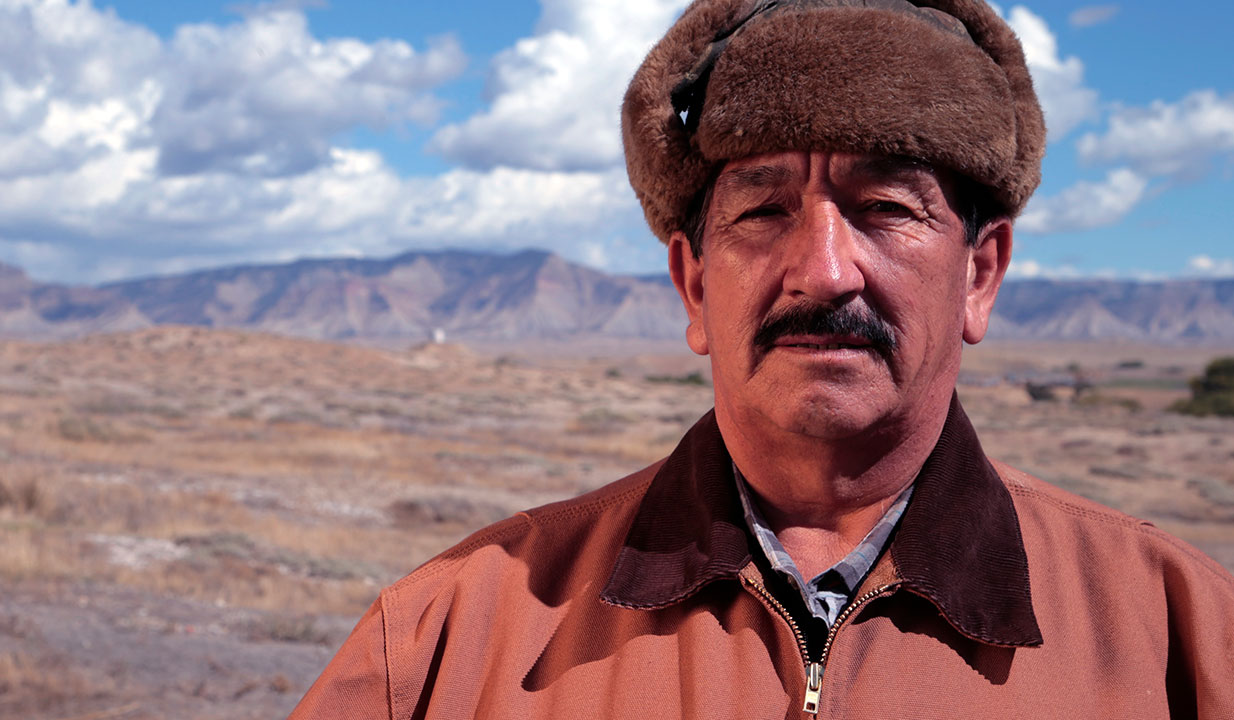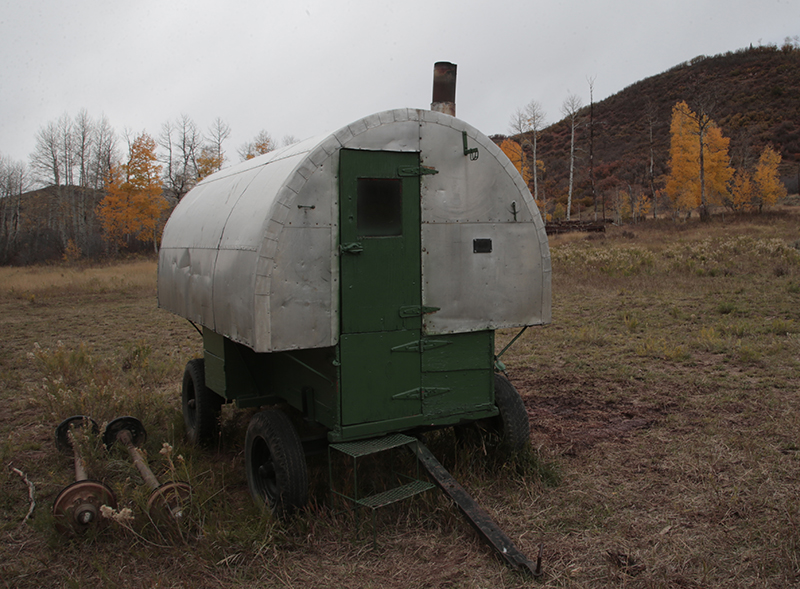
Ignacio Alvarado, a former sheep herder turned advocate, outside of Fruita, Colo. in October 2016. Photos by Joe Mahoney
Ignacio Alvarado, a former sheep herder turned advocate, outside of Fruita, Colo. in October 2016. Photos by Joe Mahoney
On a brisk day this fall, Ignacio Alvarado waited for two sheep herders to return to their camp on a hill outside of Craig, in the northwest part of Colorado.
“That’s my camper!” he exclaimed, peeking into one of the tiny trailers.
Alvarado was a herder himself in the 1990s, and is now employed by the Hispanic Affairs Project (HAP), an immigrant-rights nonprofit (and Colorado Trust grantee) that advocates for better pay and working conditions for the herders.
Alvarado’s job is to visit sheep herders, listen to their stories, deliver supplies like food if needed and let them know their rights. He did the job voluntarily for many years, and then for Colorado Legal Services before working for HAP.
Sheep herders—many of them—still live in the trailers that have been used for decades, with enough room to stretch out to sleep, a small wood-burning stove and little else. Some have an outhouse nearby. Many don’t.
We’d been driving for hours on a maze of gravel roads in the hills around Craig; once, we approached a camp and then quickly drove away when Alvarado spotted a rancher’s truck. Alvarado has gotten death threats from ranchers, he says. These were the first herders we’d encountered, and it was the tail end of the day, when the last yellow leaves on the aspen trees were lit as if from within.
The sheep herders approached on horses, their border collies trotting beside them. When they dismounted, the horses’ eyelids drooped, and the dogs fell in tired heaps. A brisk wind picked up, and began to blow rain. It was suddenly cold.

Each year, the hope of earning money for their families—and a system of active recruitment by ranchers—enlists men, mostly from South America, to sign up to herd sheep. Virtually no American will do the job. Ricardo Perez, the executive director of HAP, says that there are around 1,450 to 1,600 range workers on special H-2A visas designated for foreign livestock workers in the U.S., and roughly 300 in Colorado. Many more are working here without a visa, says Perez.
For years, the pay remained steady at $750 a month, far lower than minimum wage; a special federal designation carved out this exception specifically for this group of H-2A workers.
Then, a year ago, after a hard-won fight by Alvarado and other advocates, the U.S. Department of Labor raised the sheep herders’ base pay. The department had initially proposed a base salary of $2,441 a month by 2020, but then backed down after intense opposition from ranchers, who complained that such a pay hike would put them out of business.
The hike that the department settled on is based on the idea that the sheep herders work 48 hours a week, and will receive the federal minimum wage of $7.25 an hour by 2018. (Notably, they aren’t paid the Colorado minimum wage, which is $8.23.) Today, sheep herders in the state earn a base pay of roughly $1,200 a month, a wage that’s set to go up a small amount each year.
Alvarado says it’s still far too low, and vastly undercounts the hours sheep herders are actually required to be on the job. The new, higher wage, works out to about $2 or $3 an hour, according to HAP estimates.
“Yes, they are on call 7 days a week, 24 hours a day. Their actual working conditions … I would have been more conservative than [48 hours] on my estimate,” of how many hours sheep herders actually work per week, counters Lane Jensen, interim director of the Western Range Association, a group that represents ranchers.
During some parts of the year, the herders work longer hours, and during other times, they work less, says Jensen. Their room and board is also provided, he says.
Jensen says the recent rule change was hard on a lot of ranchers. They were required to advertise domestically for workers, he says: “None applied, so people were faced with shorthanded work, and suffered because of that.”
HAP has filed a lawsuit against the departments of Labor and Homeland Security, alleging that they undercut sheep herders’ wages by creating a permanent foreign workforce without authorization by Congress.
At issue, in part, is how the hours of the work week are established. Government agencies relied on an “unaudited review of employer-provided data,” HAP has alleged.
“The industry controls and manipulates their own regulations,” says HAP Executive Director Perez.
The departments, which didn’t respond to calls for comment, have argued that all the appropriate steps were taken in establishing the latest rule, including a thorough analysis of wage data and input from all sides.
It’s not just the pay that’s the problem, says Perez. It’s the amount of control that employers have over their employees. In part because the workers’ visas are tied to an employer and because of the nature of the work, employers have enormous power to limit the movement, associations and communications of the herders. “That’s human trafficking,” says Perez, “by the traditional concept in the dictionary.”
Jensen says: “I take offense at that. If you look very hard, you could find someone who abuses the program. But I wouldn’t say you find a lot of people who abuse the program.”
Jensen says the industry has an interest in self-regulating, and he encourages workers to make complaints directly to his association: “This is a necessary program for the sheep industry. If someone is violating the rules that could jeopardize the program, they need to be addressed.”
Colorado Legal Services and HAP, with the help of Alvarado and others, have logged testimonies by sheep herders. The workers describe being deprived of cell phones and other ways to communicate, being forbidden to receive visitors, having wages withheld for fraudulent expenses—such as to pay for “Medicare” (which doesn’t cover herders)—or having to literally escape to receive needed medical care.
There have been documented wage violations at a number of the ranches operating in Colorado. (You can see them by searching for Wage and Hour Division, or WHD, for the state of Colorado and the NAICS code 1124 on this Labor Department enforcement data page.)
One Wyoming-based operation, Vermillion Ranch, was sued in 2006 by former workers on accusations that it had engaged in human trafficking, racketeering and false imprisonment. The workers alleged that the ranch had confiscated their passports and social security cards; withheld pay; restricted their movement, even during free time; and required them to do work that was unrelated to livestock (e.g., driving heavy machinery, planting flower beds). My calls to Vermillion Ranch and its lawyers weren’t returned.
Another ranch, Peroulis & Sons, based in Craig, has been sued repeatedly over similar complaints. Workers described having to walk for hours to get away from the ranch and ask for help. My efforts to reach a representative of the Peroulis ranch were unsuccessful, and an attorney representing the ranch didn’t respond to a call.
Both cases were settled without the ranches admitting wrongdoing.
Jenifer Rodriguez is managing attorney at Colorado Legal Services, which has represented workers in five separate suits against sheep ranches, including Vermillion and Peroulis. She says it’s often dire health problems that drive shepherds to take the risk of making complaints against their employers.
“It happens frequently, because they have so many work-related accidents and they’re so dependent on employers for access to medical care,” says Rodriguez.
“A lot of them get sent back [to their country of origin]. Some of them don’t know that they have a right to workers’ compensation and to get treatment,” she says.
Those that do get medical treatment here are frequently reliant on their employers to translate in the doctor’s office. Crucial communication—including health care providers’ advice that workers limit physical activity in order to recuperate, for instance—often goes untranslated, says Rodriguez: “Those guys come out of there and they have no idea what the doctor said.”
Along with work-related injuries, says Rodriguez, sheep herders often suffer stomach ailments due to the poor quality of the food provided to them, or from inadequate sanitation. These symptoms, she adds, are sometimes misunderstood by providers unaccustomed to treating diseases resulting from contact with animals and poor hygiene.
“I don’t think the doctors are asking the right questions,” she says. “[The herders are] helping with the birthing of the sheep, or delivering aborted fetuses. They can’t wash their hands or bathe. They’re barely given any time to eat. They’re eating with the same bloody hands they do this work with.”
Rodriguez says even after the lawsuits and the new regulations, the herders’ complaints keep coming in.

It’s been two decades since Alvarado worked as a herder. During his years of herding, he says, he talked to his family back in Chile just once annually, around Christmas time. He lived without any human company for months at a time. No water, no toilet, no shower, no place to wash his clothes. Just a 6×10-foot trailer, and the constant obligations of his herd.
Alvarado is now 58. He shares a bungalow with his wife, Dora, in the pretty Western Slope town of Fruita. His Chilean accent has faded, and he jokes that he speaks Spanish with a Mexican accent, thanks to Dora and his co-workers on insulation jobs and other work crews.
But his defining purpose in life remains with the herders.
“When I left the ranch, I started fighting,” Alvarado says. “I thought it was unjust that we came so far to suffer. Many lose their families—lose the chance to see their children grow up—for so little money.”
Tom Acker is a Spanish professor at Colorado Mesa University who met Alvarado through immigrant rights meetings in Grand Junction, around 10 years ago.
At that meeting, Alvarado asked if anyone wanted to accompany him to visit the sheep herders. Acker volunteered.
Acker, who is a HAP board member, said he was unprepared for the sense of physical danger he felt while seeking out sheep herders with Alvarado. Ranchers looked unkindly on their mission, and the two of them together continued to receive the same kinds of threats that Alvarado had once endured alone, says Acker.
“Everybody’s got weapons,” Acker says.
The workers are often reluctant to talk, Acker adds, for fear of repercussions from their employers: “All they’re worried about is that they’re able to send money back to their family. They put themselves in debt bondage to get this gig up there. They’ve got to curry favor with the ranchers. Everything is dangerous for them.”
Alvarado says that when he was working as a sheep herder, he got sick with a tick-borne illness that left him vomiting and feverish. His boss at the time, Steve Raftopoulos, was on his way out of town, but said his wife would take him to the hospital, according to Alvarado. She never came. When Alvarado finally got to the hospital with the help of a friend, he says he decided not to return to the ranch.
Raftopoulos says that’s a lie.
“[Alvarado] walked out on me in the middle of the night. He wasn’t sick. I got him his permanent residency,” says Raftopoulos. “In fact, he left owing me $4,000. I got an attorney and garnished his wages.”
Continued Raftopoulos: “I’ve never discouraged my men from having visitors or talking to other men. They’re allowed to go to town, with notice so that I can have someone there. I allow them to come to town for a day. I don’t even mark it against their pay.”
Raftopoulos calls the news reports and videos alleging widespread abuses by sheep herders false, and says critics misunderstand the costs of sheep herding. He hasn’t made a profit in two or three years, he says, while his workers are making as much as professors or lawyers in their home countries, with almost no living expenses.
“The western range operations, these migratory operations, you can’t turn the switch and allow people to go home Saturday and Sunday,” he says. “It’s 24 hours a day, 7 days a week, and the men know that.
“They know the job. They know it’s 24-7. You have to take care of the animals. They know when they come here that’s what the job is. It’s not like they come in blind.”

The men we met outside Craig were stiff, cautious. Their conditions were fine. The pay was fine. They’d been paid on time. They didn’t want their photos taken. They didn’t want to talk.
Alvarado started talking about his work, and his experiences as a herder. The men visibly relaxed.
“You’re slaves,” Alvarado said, and the three of them chuckled.
“See those dogs?” one herder joined in. “You can take them anywhere. The mountains, the desert. They’ll get used to it.
“But we’re not dogs. We’re humans.”
One man agreed to talk to me, provided that I not use his name or otherwise identify him. Part of the problem, he said, was the situation in Peru, the country he and most other herders come from these days. Though the Latin American country is rich in natural resources like copper and silver, poverty remains deeply entrenched in rural areas, while corruption is endemic. He couldn’t find work there, and so he signed the three-year contract to herd sheep.
The length of time away from his family, he said, is the most difficult part of being a sheep herder here. Yes, it is brutally cold in winter and terribly hot in summer; Peru’s climate is more temperate. He also worried about who would pay his medical costs if he got sick; worker’s comp would pay for a work-related injury, but he has no health insurance to cover other illnesses.
All these concerns paled in comparison to one: Would his kids know him when he got back?
“The happiest day will be when I reunite with my family,” he said. He hoped that his son could get an education, and someday live in a city in the United States or somewhere else. “That’s the hope,” he said.